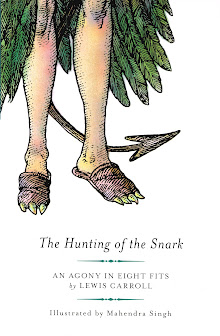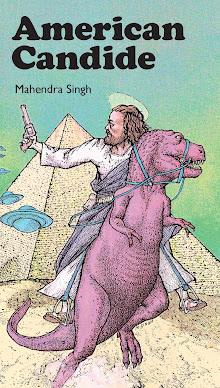The provenance of this image is, I confess, is a hopelessly adulterated concoction of all the flotsam & jetsam which churns up my head:
• Corrupted retinal imprints of an Alma-Tadema confection of Egytian heirophants barging down the Nile.
• Scattered brain-crumb trail of Enobarbus channeling Shakespeare's fancification of Jacques Amyot's crib of Plutarch's précis of Cleopatra a-burning on the water.
• Thomas Mann's Deutsche Bahn-ification of the disgraced Joseph's descent down the Nile in the Joseph Tetralogy.
• A muddled childhood memory of Thor Heyerdahl's voyages … over-saturated Technicolor imagery of Incan fellahin poling their islands of bundled reeds across Lake Titicaca, through Upper Egypt and down to Easter Island.
• Most importantly, the compulsion to depict accurately an object of stone floating in water, hence proving it as light as a duck and therefore, a witch.
To those who insist upon a certain logical decorum in the threads binding an image to a text, I say: pshaw! I just rummage through the cultural debris and emotional wheel ruts, happy as a tove in a wabe. If poetry is metaphor, and metaphor is image-making, then there's more critical analysis in one panel of this Snark than in the many pages of intellectual jiggery-pokery with which Lewis Carroll has been belabored through the ages.
On the deck of the HMS Snark, we also can see The Barrister and The Billiard-Marker playing at dice over a fragment of an aortic blood vessel which appears to have been illicitly removed from the poet Dante Alighieri (why? Because I say so). Here's what Witold Gombrowicz, said about Dante and his Divine Comedy, another famous poem about Snarks …
"Dante was reciting his epoch, but the epoch was also reciting, and the poem is, so to speak, a double platitude, the poet simply recited what was already being recited. Something like those Sunday discussions of soccer by people gathered in bars and coffee houses. Do they really care about soccer? Not in the least. … Humanity glides along the worn ruts of articulation. An empty poem, which exists in defiance of reality and almost as if to spite it!"*
Well, doesn't that just about wrap it up for The Meaning of the Snark? I mean, simply substitute Lewis Carroll for Dante (deep inside, you know you really want to) and there it is, a poem about nothing! A drawing about nothing! And whatever it is that you read into the drawing, that's what you truly wanted all along — and thus, deserve!
Yes, yes, yes! I know that Lewis Carroll spoke no Italian outside his bathing machine. And yes, he did claim total ignorance of the meaning of his work, in English or Italian — unlike Dante (Alighieri, not "Wombat" Rossetti), who wouldn't shut up about his boojums. Frankly, I don't know what I'm doing either, it's all the rage these days and I think it's going rather well, it always does when you draw with your eyes wide shut.
_________________
*W. Gombrowicz, Diary, Volume 3, October 16, 1966, translated by Lillian Vallee, Northwestern Univ. Press, 1993. The works of Gombrowicz are ideal for name-dropping at academic and intellectual soirées, preferably from an upstairs window and attached to an anvil.
Monday, September 25, 2017
Monday, September 18, 2017
Turinese Snark
Alberto Savinio had this to say about animals such as the Beaver who are always trying to draw attention to themselves:
"Totemism is a sign of the dignity that animals once enjoyed, a testimony that the earth was once a paradise … our memory of the time when animals lived with us as companions and equals contains the most encouraging idea of the future of the world, an idea that lets us glimpse, beyond the contraction of peoples into themselves, their expansion into a common brotherhood, and finally their new merging with the animals in a paradise regained."
In this panel we see the final and ultimate member of the crew, the Butcher, apparently menacing the Beaver in an umbrous manner while she is at play. Is the Butcher truly malevolent towards the Beaver as the text insinuates or is he pursuing that childish dream of Eden which she rolls before her? Universal brotherhood of sentient beings or ignominous immolation at the hands of a petrified maniac?
Clues abound: the (conveniently) protean decor of the HMS Snark, indeed, the entire mise en scène is redolent of the fashionably unsettled piazzi of Turin, a place notorious for the alpine fogs which beset and befuddle its inhabitants. A similar metaphysical ennui settles heavily over both the Beaver and the hinted-at Butcher, perhaps they are in that liminal state which Savinio alludes to, struggling to emerge from a state of totemic memories into a future Paradise Regained? Is Lewis Carroll hinting at an eschatalogical program of redemption here? Is the Hunting of the Snark really a music-hall species of the Divine Comedy, the Snark is Beatrice, the Baker is Dante and the crew of the HMS Snark, a multicephalic crypto-gnostic Virgil?
Or is it all just a load of rubbish, the useless odds and ends found inside an Oxford don's pilfered portmanteau, disparate rubbish strewn about the paving stones of a Turinese piazza by a disappointed thief who had been posing as a railway porter on the Bragia trunk line, the better to prey upon Englishmen doing the Grand Tour? Savinio had this to say about the dodgy sort of things that can spring out of a fellow's portmanteau on a chilly Piedmontese morning:
"Romanticism: the terror of nature, its forests, its tempests, its dawns, its splendors … surrealism: the internal terror of a man, his forests, his tempests, his dawns, his splendor."
"Totemism is a sign of the dignity that animals once enjoyed, a testimony that the earth was once a paradise … our memory of the time when animals lived with us as companions and equals contains the most encouraging idea of the future of the world, an idea that lets us glimpse, beyond the contraction of peoples into themselves, their expansion into a common brotherhood, and finally their new merging with the animals in a paradise regained."
In this panel we see the final and ultimate member of the crew, the Butcher, apparently menacing the Beaver in an umbrous manner while she is at play. Is the Butcher truly malevolent towards the Beaver as the text insinuates or is he pursuing that childish dream of Eden which she rolls before her? Universal brotherhood of sentient beings or ignominous immolation at the hands of a petrified maniac?
Clues abound: the (conveniently) protean decor of the HMS Snark, indeed, the entire mise en scène is redolent of the fashionably unsettled piazzi of Turin, a place notorious for the alpine fogs which beset and befuddle its inhabitants. A similar metaphysical ennui settles heavily over both the Beaver and the hinted-at Butcher, perhaps they are in that liminal state which Savinio alludes to, struggling to emerge from a state of totemic memories into a future Paradise Regained? Is Lewis Carroll hinting at an eschatalogical program of redemption here? Is the Hunting of the Snark really a music-hall species of the Divine Comedy, the Snark is Beatrice, the Baker is Dante and the crew of the HMS Snark, a multicephalic crypto-gnostic Virgil?
 |
| Mystery and Melancholy of a Street, Giorgio de Chirico |
"Romanticism: the terror of nature, its forests, its tempests, its dawns, its splendors … surrealism: the internal terror of a man, his forests, his tempests, his dawns, his splendor."
Subscribe to:
Comments (Atom)









